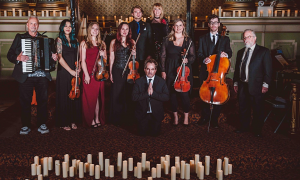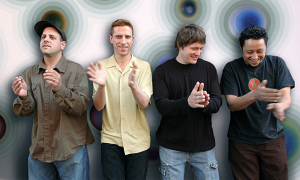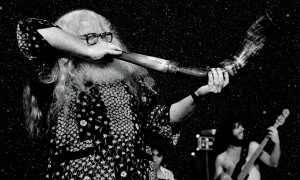Home » Jazz Articles » From the Inside Out » Sonic Styles of the Seventies
Sonic Styles of the Seventies
 Hugo Fattoruso
Hugo FattorusoHugo Fattoruso Y Bario Opa
Far Out Recordings
2018
Once upon a time in Uruguay, teenage brothers Osvaldo and Hugo Fattoruso stepped out of their musical family trio to play guitar and bass for popular Latin American jazz (swing) and rock 'n' roll ensembles venturing in and around the region, woodshedding which gave them time and space to work candombe rhythms and bossa nova harmonies, and their attendant Afro-Cuban and European underpinnings, into the Fattoruso's own composing style. Hugo eventually moved to New York City, redoubled the Afro-Cuban and jazz elements of his own music, and formed Opa. Opa, underground legends of 1970s jazz-rock-funk fusion, backed Airto Moreira on the percussionist's most successful recordings (including 1973's Fingers [CTI Records]) and also appeared on landmark sessions by Flora Purim (Encounter, 1976 [Milestone]), Milton Nascimento (Nascimento, 1997 [Warner Bros.]) and other Brazilian artists.
On Hugo Fattoruso Y Bario Opa, Fattoruso's unmistakable keyboard touch re-emerges in an ensemble that includes his son Francisco on bass, guitarist Nicolás Ibarburu, and FIVE percussionists: Tato Bolognini on drums, Albana Barrocas on percussion, and the three-headed monster of the Silva brothers (Matthias, Guilermo Diaz and Wellington), from whose Afro-Uruguayan candombe rhythms the entire set blasts off.
Penned by Francisco, "Candombe Beat Funk" swings between two rhythmic movements, shifting back and forth on the composer's bass, which upshifts his dad's keyboard spotlight into overdrive. Layers of acoustic percussion build into "Candombelek," adorned with tropical vocals and the leader's cool, crisp electric keyboards. Its companion piece "Candombe Alto" burns more hot and bright with Afro-Cuban rhythms, and gloriously crowns its percussive heat with an electric keyboard melody that Fattoruso unleashes like a soaring, spiraling eagle.
The Fattoruso clan collectively melt a new original "Antes" into an update of "Goldenwings," the title track of Opa's 1976 eponymous debut (Milestone Records) and an underground funk-disco club hit. This new "Goldenwings" splatters the melody to "Summertime" in multiple directions, with the bassist digging up lines that squiggle, bounce and stretch like rubber and the guitarist popping off a solo that sounds like Latin, jazz AND rock rocketing through this atmospheric mix. An acoustic piano trio tosses the melody "Botijas" into churning waves of jazz and rhythm that threaten to break completely out of its arrangement.
The closing "Berimba-ô" and "Anima 2" further highlight the African roots from which Fattoruso's music—colorful but mysterious, like flowers in a moonlit meadow—continues to grow.
 Craig Fraedrich
Craig FraedrichOut of the Blues
Self-Produced
2017
Out of the Blues, featuring Craig Fraedrich on trumpet and flugelhorn with The Jazz Trumpet Ensemble, would have sounded great in the sweltering hard-bop landscape that Cannonball Adderley, The Jazz Messengers led by Art Blakey, Horace Silver and other jazz legends began to explore in the late 1950s.
Fraedrich has been featured trumpet soloist with The Army Blues, the premier jazz ensemble of the US Army, since 1986. He has also served as the group's trumpet section leader, assistant group leader, and musical director, and has composed or arranged more than 100 pieces for the Blues. Even the most summary list of his other collaborators includes such jazz legends as Curtis Fuller, Dave Liebman, Jon Faddis, Louis Belson, Ramsey Lewis, and...you get the idea. Trumpet co-lead Kenny Rittenhouse and all the other musicians on this set are also current or former members of The Blues. As trumpet player, educator and entrepreneur Nick Mondello cautions in its liner notes: "These guys don't play trumpets; they play flamethrowers."
From the opening "A Minor Matter," tempos and sounds on Out of the Blues prove Mondello's words true: Soloists Rittenhouse, Fraedrich and guitarist Jim Roberts rip through this set with passion and power. Their playing honors hard-charging jazz trumpet greats such as Dizzy Gillespie and Freddie Hubbard, but you can hear the sound of their own voices, too.
What sounds like Hammond B-3 organ funk in "BugaBlue" is actually an effect on Roberts' guitar, as pianist Tony Nalker's quick dips into soul-jazz keep the groove swinging and solos by Rittenhouse and Fraedrich sound like carbon copies played high, hard and hot. Fraedrich's curious choice of muted trumpet in the John Coltrane warhorse "Giant Steps" only slightly pulls back its breakneck pace, at least until subsequent solos by Graham Breedlove and Rittenhouse whip it into its finishing sprint.
Among all these gallops and sprints, the balladic blues "Sometimes I Feel Like a Motherless Child" shines like a gemstone. Fraedrich's lead flugelhorn softly emerges from the ensemble, first to wander and wonder, sweet and sad, in stark solitude; but then more confidently steps from unsure meditation into full-blown declaration in a sound that nearly says, "Yes I can!"
Out of the Blues would have sounded just fine cooking through the hard-bop kitchens manned by Blakey, Silver, and company six decades ago, which most likely means that it will sound just fine six decades from now, too.
 Rhett Frazier
Rhett FrazierWelcome to the Club
Self-Produced
2017
Rhett Frazier was born and raised in Texas and Oklahoma. Born and raised by family deeply steeped in every strain of America's soul music. And born and raised to vocally stomp through soul and funk. Grandpop played guitar and fiddle in a western swing band. Cousins Alan and Mike are bluegrass and country music mainstays The Frazier Brothers. Uncle Mick Roemer is a jazz pianist and singer.
After fronting several incendiary blues bands that barnstormed through Texas and Oklahoma, Frazier traveled to Los Angeles to record his dream album—a soul record in the classic southern styles of Hi Records and/or Stax Records. But like so many music business dreams, Frazier's dream got shelved. It was never released.
Instead, the singer turned the page with two skeletal funk albums as Rhett Frazier, Inc. (2010's Escape from Dee-Troyt [Digi-Soul] and 2012's Every Day is Saturday [Double Inc.]), which became mainstays in the LA electric soul scene.
But in 2017, Frazier made his own dream come true by releasing that dream album his damn self. Welcome to the Club proves that he was absolutely right to stay committed to that dream. Produced by Dusty Wakeman (mixmaster for country artists Lucinda Williams and Dwight Yoakum) and featuring Dick Sims (from Eric Clapton's band) on keyboards and soulful Hammond B-3 plus multi-horn player Lee Thornburg (Tower of Power), it captures all the disparate threads of Frazier's vision.
In this swirling soul cauldron, the Scottish edges on Frazier's voice take on the powerful spiritualism of Van Morrison digging deep into Ray Charles soul, especially when Frazier vamps out the closing to the title track and "Holy Pimp," where he wails like Little Richard sitting on a red-hot poker.
"Always on the Outside" compacts rock and soul and rhythm and blues into three sparkling minutes, the kind of fifties soul that Peter Wolf so often and so lovingly resurrected in The J. Geils Band. "Stalemate" slowly but steadily cooks up Memphis blues bubbling with soulful organs, mournful guitars, and just enough backbeat to keep the music from standing still; it's a musical shame that Prince didn't live to cover this soulful blues in his inimitable purples.
But nothing surpasses Frazier's cover of the Jimmy Miller/Steve Winwood classic "I'm a Man," graced by the vocal presence of Mr. Spencer Davis in its backing chorus. You can tell from the pounding bass, cool as ice congas, and clawing guitar chords in its introduction that Frazier's going to use his voice as both scalpel and axe to tear this playhouse down. By the end of it, Frazier's stomping and snarling at the edges of his range like a shaman seeking possession. You simply cannot sing this song any better.
It's entirely possible that Welcome to the Club makes your own soul dreams come true, too.
 Nils Landgren Funk Unit
Nils Landgren Funk Unit Unbreakable
ACT Records
2017
The very first album released by German progressive label ACT Records (in 1994) was by the Funk Unit led by trombone master Nils Landgren, recorded Live in Stockholm that summer with Maceo Parker as special guest. Other Funk Unit releases for ACT Records include Paint It Blue (1996), the trombonist's tribute to composer/saxophonist Cannonball Adderley with Randy Brecker, Michael Brecker, drummer Bernard Purdie and other guests; and Funky Abba (2004), Landgren's Funk Unit tribute to the legendary Swedish popsters, graced by not only reclusive pianist Benny Andersson's blessing but himself on piano.
Unbreakable was recorded at famous Atlantis Studios in Stockholm, where ABBA recorded many of their hit records. Randy Brecker and Tim Hagans guest star on trumpet, with guitarist Ray Parker, Jr. throwing down as a special Funk Unit member just for this occasion. Landgren is especially fond of its title: "Throughout all our years together, there have been countless moments of great joy and laughter, but also times when we had to fight to stay on the right track. Remembering the highs always helped us to face the lows and to get back up on our feet. The love for the music and for each other has always won and always will. We are unbreakable."
Parker's rhythm guitar hook slices open the title track and then drummer Robert Ikiz nails the funk groove down, Landgren blows funk and fire through his trombone and the rest of the Unit tighten up a Tower of Power horn-stoked groove that's clean, pristine, and slippery as vasoline. Their bouncy romp through "Just a Kiss Away," written by New Orleans legend Allen Toussaint, sounds like a musical love letter from Sweden to the deep American south—earthy but slick and colored in shades of country and blues.
"Old School" gloriously melts form into content, old-school funk extolling the virtues of old-school funk with guitar and drums scattering the rhythm like flower petals beneath the horn players' dancing feet. "Rockin' After Midnight" (Marvin Gaye) kicks out the all-star jams, with Parker's itchy rhythmic hook and Brecker's trumpet solo—processed in electronics but gestated in jazz—shining out from an ensemble that rumbles like musical thunder.
PS: Bail out before the closing track, even though you'll miss a nice Parker guitar solo. Nils, if you're reading: After an hour of taut, tight funk, why would you need to drop faux ghetto patois into "Bow Down" to sound cool? "You like to think that you was all that/ I guess you lied 'cause you know that you're whack," in a sexagenarian voice of any gender, ethnicity, or persuasion, is embarrassing for both speaker and listener. This set was plenty good without it.
 Malo
MaloLatin Bugaloo: The Warner Bros. Singles
Omnivore Recordings
2018
"Malo was pretty much a jam," reflects Malo bandleader Jorge Santana (younger brother to Carlos Santana) in the notes to Latin Bugaloo. "Just a lot of natural energy. But it had to be structured into an arrangement."
Latin Bugaloo compiles the A-and B-sides of six Malo singles released during the band's 1970s golden age, plus two sides ("Pana" and "Just Say Goodbye") released as a single only in Turkey for reasons not even Santana remembers. Because the original albums versions of these songs often ran around ten minutes ("pretty much a jam"), these edited single versions sound almost new. "Malo has something that set it apart from established groups like El Chicano," Santana continues. "We had Latin percussion and we had a horn section."
And they had "Suavecito," the breakout hit single from their debut album, often called "the Chicano national anthem," and written by the band's timbale player (Richard Bean) as a poem to a girl in his high school algebra class. Equal parts War's "Summer" and the Young Rascals' "Groovin,'" and featuring Coke Escovedo (percussion), Luis Gasca (trumpet), and a chunky Chicano backbeat, "Suavecito" radiates all the wonder of youthful love like heat from a blacktop roof and sounds almost impossibly sweet in July's hot summer sunshine.
B-side "Nena" churns out a Latin-rock raveup full of blasting horns and busted open by trombone, trumpet and electric guitar solos, a frantic and spirited unbridled romp like a pony still learning its own strength, reach and grasp.
Written by legendary Cuban pianist and sometimes Malo member Francisco Aguabella, "Merengue" also rockets out of the gate, with acoustic and electric piano horsewhipping the band into a torrid pace as they twist and shout to the glories of this passionate dance. Santana's electric guitar solo in the break is as wiry and electric as a bolt of lightning, erupting against the percussionists' pounding thunder. (Wheels within wheels: "Merenge" was the B-side to the folkish blues "I Don't Know," which was written by guitarist Clarence "Sonny" Henry, better known for his composition "Evil Ways.")
"Café" sounds very much like Jorge's older brother's hit "Supernatural," flowing with soul and clattering with percussive timbales. (Malo wasn't much for ballads.)
"We were simply young," Santana wistfully recalls. "Too young for understanding the blessings that we had all received: Having an album out, having the opportunity to play among each other as a band, and to tour."
"It was quite a ride."
 Marbin
MarbinIsraeli Jazz
Self-Produced
2018
Marbin's name and music come from the combined visions of saxophonist Danny Markovitch and guitarist Dani Rabin. Dani was born in California but grew up in Israel, where he met Markovitch and first formed Marbin as a duo in 2007.
"Both Danny and I grew up in Israel listening to Israeli music, but we also grew up listening to jazz, rock, folk and blues," Rabin explains. "We felt it's appropriate to name the album Israeli Jazz because it gives a more whole and nuanced look to music that undeniably has Israeli roots, but at the same time is drawing from other traditions and fuses them into a coherent vision."
There's no doubt magic in their combination. With a powerhouse rhythm section (bassist Jon Nadel and drummer Blake Jiracek) keeping solid time, the two primary voices in Marbin play more like one. In more than a few places in their Israeli Jazz, you cannot tell their voices apart.
"The Old Ways" sound exciting and new in Marbin's eight hands: Dancing saxophone and drums call the tribe to order, then electric guitar chords grow more forceful and loud until a blues-rock-jazz guitar jam erupts, Robin Trower meets Jimi Hendrix meets Duane Allman burnt into a single sound in Rabin's Israeli crucible. "Swamp House" opens as an unaccompanied electric guitar blues, a mournful and solitary moan from a wetlands shack in the deep American South. Bass and drums, and then the saxophone, tumble and dance into the arrangement to raise both its tempo and spirit.
Two back-to-back offerings suggest cocktail hour: "Moscow Mule" displays a distinctly Russian saxophone sound and melody which Rabin shreds like a garment; "Pirate Punch" doubles up its heady pleasures with a spacious moody blues that eventually erupts into a communal jam that's simultaneously world, rock, blues, and jazz music. And again, when Rabin and Markovitch play together, your ears cannot tell them apart.
"To us, jazz is about the spirit of the music. At the heart of our music there are always improvised solos over harmony and form," Markovitch muses. "Good jazz always has a delicate balance between chaos, the solos, and order, the compositions/arrangements, and that's the line we tread on while allowing ourselves to explore all the other aspects of music."
Tracks and Personnel:
Hugo Fattoruso Y Bario Opa
Tracks: La Del Cheche; Botijas; Candombe Beat Funk; El Romance Del Sordo; Trenes De Tokyo; Candombelek; Candombe Alto; Llamada Insólita; Antes / Goldenwings; For You To Be Proud; Berimba-ô; Anima 2.
Personnel: Hugo Fattoruso: keyboards, vocals, arrangements; Francisco Fattoruso: bass; Tato Bolognini: drums; Albana Barrocas: percussion, vocals; Nicolás Ibarburu: electric guitar; Mathías Silva: tambor piano; Guillermo Díaz Silva: tambor chico; Wellington Silva: tambor repique.
Out of the Blues
Tracks: A Minor Matter; Shades of Blue; BugaBlue; Never Let Me Go; R.S.V.P.; Sometimes I Feel Like a Motherless Child; Giant Steps; Missing You; I'll See You in a Bb Blues.
Personnel: Craig Fraedrich: trumpet, flugelhorn; Mark Wood: trumpet, flugelhorn; Ken McGee: trumpet, flugelhorn; Graham Breedlove: trumpet, flugelhorn; Kenny Rittenhouse: trumpet, flugelhorn; Tony Nalker: piano; Jim Roberts: guitar; Steve Fidyk: drums; Regan Brough: bass.
Welcome to the Club
Tracks: Welcome to the Club; Holy Pimp; Tell; I'm a Man; Eat Your Heart Out; Stalemate; Funky Junky; Sonny Liston; Honest Wage; Always on the Outside; 3 Day Binge.
Personnel: Rhett Frazier: vocals; Dusty Wakeman: bass, backing vocals; Ted Hutt: lead guitar; Marcelo Cosenza: rhythm guitar; Pride Hutchison: drums; Dick Sims: keyboards, Hammond B-3, Fender Rhodes, Wurlitzer; Lee Thornburg: trumpet, trombone, flute; Dave "Woody" Woodford: saxophone; Juke Logan: harmonica; Donny Gerard: backing vocals; Chris Pierce: backing vocals; Sergio Pastora: percussion; Doug Pettibone: lead guitar, pedal steel; Gia Ciambotti: backing vocals; Spencer Davis: backing vocals; Roberta Freeman: backing vocals; Renee Goldberry: backing vocals; Denny Freeman: lead guitar.
Unbreakable
Tracks: Unbreakable; Just a Kiss Away; Get Down on the Funk; Friday Night; Stars in Your Eyes; Rockin' After Midnight; Soulchild; Old School; NLFU Funk; Bow Down.
Personnel: Petter Bergander: keyboards; Randy Brecker: trumpet; Tim Hagans: trumpet; Robert Ikiz: drums; Nils Landgren: trombone, vocals; Ray Parker, Jr.: guitar, vocals; Andy Pfeiler: guitar, vocals; Magnum Coltrane Price: bass, keyboards, vocals; Jonas Wall: horn arrangements, saxophone.
Latin Bugaloo: The Warner Bros. Singles
Tracks: Suavecito; Nena; Cafe; Peace; Just Say Goodbye; Pana; I'm For Real; Oye Mamá; Latin Bugaloo; Midnight Thoughts; I Don't Know; Merengue; Love Will Survive; Think About Love.
Personnel: Bill Atwood: trumpet; Richard Bean: timbales, vocals; George Bermudez: congas; Forrest Buchtel: trumpet; Hadley Caliman: flute, baritone sax, tenor sax; Ron Demasi: clarinet, clavinet, flugelhorn, mellotron, organ, electric piano, synthesizer, trumpet, vibraphone, vocals; Carlos Federico: vocals; Mike Fugate: trumpet; Arcelio Garcia, Jr.: percussion, vocals; Luis Gasca: trumpet; Mike Heathman: trombone; Richard Kermode: organ, percussion, piano, electric piano; Nick Mendez: bongos, timbales; Roy Murray: horns; Tom Poole: trumpet; Bobby Ramirez: drums; Raul Rekow: congas; Alex Rodriguez: trumpet; Leo Rosales: bongos, congas, drums, percussion, timbales, vocals; Jorge Santana: acoustic guitar, electric guitar, percussion, violin; Steve Sherard: trombone, vocals; Tony Smith: drums, vocals; Richard Spremich: drums; Pablo Tellez: acoustic bass, electric bass, guitar, percussion, timbales, vocals; John Watson: vocals; Willie G.: vocals; Abel Zarate: guitar, vocals.
Israeli Jazz
Tracks: The Old Ways; Swamp House; Arkansas Jumper; Moscow Mule; Pirate Punch; Magic Burro; Israeli Jazz.
Personnel: Dani Rabin: guitar; Danny Markovitch: saxophones; Jon Nadel: bass; Blake Jiracek: drums.
Comments
About Hugo Fattoruso
Instrument: Multi-instrumentalist
Related Articles | Concerts | Albums | Photos | Similar ToTags
From the Inside Out
Chris M. Slawecki
Hugo Fattoruso
Opa
Airto Moreira
Flora Purim
Milton Nascimento
Craig Fraedrich
The Jazz Trumpet Ensemble
Cannonball Adderley
The Jazz Messengers
Art Blakey
Horace Silver
The Army Blues
Curtis Fuller
Dave Liebman
Jon Faddis
Louis Belson
Ramsey Lewis
Kenny Rittenhouse
Nick Mondello
Jim Roberts
Dizzy Gillespie
Tony Nalker
John Coltrane
Graham Breedlove
Rhett Frazier
Mick Roemer
Rhett Frazier, Inc.
Dusty Wakeman
Lucinda Williams
Dwight Yoakum
Dick Sims
Eric Clapton
Lee Thornburg
Tower of Power
Van Morrison
Ray Charles
Little Richard
Peter Wolf
The J. Geils Band
Jimmy Miller
Steve Winwood
Nils Landgren Funk Unit
Nils Landgren
Maceo Parker
Randy Brecker
Michael Brecker
Bernard Purdie
Tim Hagans
Ray Parker Jr.
Allen Toussaint
Marvin Gaye
Malo
Jorge Santana
War
Coke Escovedo
Luis Gasca
Francisco Aguabella
Marbin
Danny Markovitch
Dani Rabin
Jon Nadel
Blake Jiracek
Robin Trower
Jimi Hendrix
Duane Allman
For the Love of Jazz
 All About Jazz has been a pillar of jazz since 1995, championing it as an art form and, more importantly, supporting the musicians who create it. Our enduring commitment has made "AAJ" one of the most culturally important websites of its kind, read by hundreds of thousands of fans, musicians and industry figures every month.
All About Jazz has been a pillar of jazz since 1995, championing it as an art form and, more importantly, supporting the musicians who create it. Our enduring commitment has made "AAJ" one of the most culturally important websites of its kind, read by hundreds of thousands of fans, musicians and industry figures every month.























